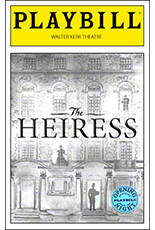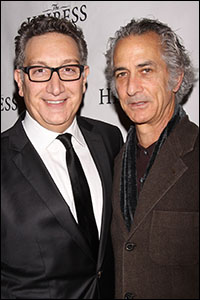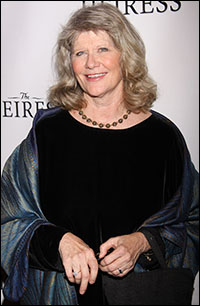
*
It's not so much a curtsey as it is a wilt, this thing Jessica Chastain does in the company of strangers — a wallflower struggling to blossom and falling painfully shy of the mark. She is The Heiress, freshly arrived (Nov. 1) at the Walter Kerr Theatre.
Chastain, a Hollywood Cinderella stretching herself to an awesome stage challenge, is gamely going for broke in her Broadway debut, following four other formidable ladies down The Great White Way (Wendy Hiller, Margaret Phillips, Jane Alexander and the Tony-winning Cherry Jones) in the role of Catherine Sloper of 16 Washington Square, a part consisting almost entirely of primal cries of the heart.
The late mistress of the manor there, who died giving birth to Catherine, pervades the place where Catherine grew up, unloved, embroidering her way into premature spinsterhood. Her father, a prominent physician in New York of the mid-1800s, privately holds her responsible for his wife's death but disguises that with an overly protective, even oppressive sense of "love." This — and the threat of disinheritance — keep suitors at arm's length till one dazzled and determined worthy, Morris Townsend, slips through the ranks in two weeks' time and extracts a promise of marriage moments after the two agree to go on a first-name basis. Phew!
All this, with its Oedipal overlap and sexual starvation, would have made a suitable case for treatment for psychologist William James at the time. Instead, his brother Henry got his 1880 novel out of it, "Washington Square," and, posthumously, that became his one commercial success when Ruth and Augustus Goetz carved a classic play out of it. They used the Henry James title when they tried it out in Boston, with a happy ending that had been forced on them by their producer, and it flopped profoundly. Returning to the drawing board, they retitled the piece The Heiress and sharpened the focus on a rich daughter denied love until money becomes an issue.
Moisés Kaufman said he stepped up to the plate to direct The Heiress because he's "a huge fan of Henry James. I've devoured all his novels. I think he's one of those people who profoundly understood human psychology. He really got so much so right so early on. Often what happens is that you can have a great novel, but how often is the translation from the novel to the play a failure? Those attempts fail because the novel, by its form, allows you to spend a lot of the time in the minutia of life. The stage doesn't deal with that. The stage deals with big characters and big emotions — but here they manage, because the characters are so well observed, they manage to be very stage-worthy characters. I think the Goetzes just did a great job at understanding everything that was theatrical both in terms of great characters and great dramatic events. Although there are times where the adaptation is not faithful to the story of the novel, it is faithful to the spirit of the novel. The emotions dissipate over the novel, but they're more concentrated and better constructed in the play. And how often can you say that? From the book to the play — it's very rare."
"For me, with my passion for Henry James, this production was the most Jamesian of all the productions I've seen — like, it's part Heiress and part 'Turn of the Screw.' I really wanted to bring out the dark Henry James part of it. And what was terrific about these actors is that they, too, fell in love with Henry James and they, too, were curious about the literary birthplace of the play. I took the entire cast to The Merchant House because I wanted them to have the experience of being there."
The historic Merchant House on East 4th Street also inspired the scenic design of Derek McLane — up to a point. "The walls of The Merchant House were all white, and I went with the image of tulle leather for the walls. The other thing that's interesting about this play is, not only is the house grand, it's also austere. Dr. Sloper has a very austere personality — he's a severe guy — and so it's an interesting combination of grandeur and austerity at the same time. Trying to create that balance is an important part of the job."
McLane's next designing project is a total secret — The Academy Awards show on Feb. 24, 2013. "I can't tell you about it," he said, "or they'd kill me — or I'd have to kill you."

Buy this Limited Collector's Edition |
She even pleaded guilty to a prosthetic nose (which may, or may not have, shrunk in previews). "I can put it on myself," she beamed blissfully. "It's not a big deal, really. I just thought it was important to alter my appearance from how people know me."
Unlike Olivia de Havilland, who has said she owes some of her Oscar for Catherine Sloper to a "wicked, selfish" playing partner — specifically, to Ralph Richardson, who adopted the personality of Dr. Sloper during filming and tried his Oscar-nominated damnedest to steal scenes — Chastain had nothing but praise for her stage dad. "I love working with David Strathairn. He was so helpful. I've learned a lot from him."
This is something of a father-daughter stage reunion for Strathairn and Chastain, who first did those roles in a 2004 Richard Nelson play at Playwrights Horizons called Rodney's Wife — and, if you thought the Slopers were screwed up, welcome to the 20th century! "It was a very different kind of character," she allowed. "It took place in the 1960s, and I played his daughter, who was a closet lesbian who is having an affair and in love with his current wife, my stepmother [Havilland Morris]."
Something else the two have in common: both are currently getting Oscar buzz — Chastain for Kathryn Bigelow's Navy SEAL saga, "Zero Dark Thirty," and Strathairn for his third-billed (after Daniel Day-Lewis and Sally Field) performance of Secretary of State William Seward in Steven Spielberg's $50-million epic, "Lincoln." "The script by Tony Kushner is extraordinary, and Daniel Day-Lewis will set the bar very, very, very high in terms of a Lincoln impersonation," Strathairn promised.
 |
||
| Moises Kaufman and David Strathairn |
||
| Photo by Joseph Marzullo/WENN |
What does he think of the character he is playing in The Heiress? In two words: "Not much. It's quite a challenge to make this man more than a tyrant. I think he is full of complexities and complications, and that's sad — sad for everyone involved."
Britain's Dan Stevens bounded across the pond (and, specifically, TV's "Downton Abbey") to make his Broadway debut here as that amorous interloper Morris Townsend, and he likes that the character is unequivocally, a question mark. "There are ambiguities in a lot of the roles in this play, and the part that the audience picks can shift so quickly and so readily. That was one of the things I noticed when I was reading it. The first time I read it, I saw it one way — and I sat down and immediately read the play again, and I read it in a completely different way. I think you get that experience from watching it. You can judge Morris in one way or you can judge him in another, and we like to leave some of the questions that you might ask about him unanswered. Audiences come away feeling very different about him, and I love that."
How does the character stack up against the Matthew Crawley he plays on the "Downton Abbey" series? "If there's any comparison at all, they're middle-class outsiders, but Matthew is walking into a huge inheritance, and Morris had a bit of money but it seems to have disappeared one way or another, and he's desperate to find some security in New York society in that time. I think Morris is more of an esthete than Matthew. Morris has a great appreciation for beautiful things."
 |
||
| Judith Ivey |
||
| photo by Joseph Marzullo/WENN |
Traces of Amanda Wingfield flutter around Aunt Lavinia. "They're relatives, aren't they?" agreed Judith Ivey, who has now played both roles. "I think that they would probably hang out together. They might irritate each other, though."
Ivey explained, "Aunt Penniman isn't always thought of as being that funny. I always look for the humor in a character, and then I leave it up to the director to say, 'I don't want her to be funny at that point,' which is what Moises did. I just feel that's my job — to come in and give you who I think she is and mine it as much as I can. The script often says, 'No, no, it's not funny' so, of course, you don't find anything funny."
The script speaks up in the final stretch when Ivey turns ramrod-tough and confronts her brother about the terrible mess he is making of her niece's life. "That's something that has developed in the past week or so, finding that side of her," Ivey said. "Someone who's that passionate and that happy can also have that dark side and attack him and say, 'Why are you doing this? You're destroying her life.'"
Lead producer Paula Wagner, sumptuously outfitted in a swirl of black lace, was plainly pleased at what she had put together. "I love The Heiress and always have," she admitted. "It has a great woman's role — a triumphant, fascinating female character. And it's uniquely contemporary, even though it's set a century and a half ago." Liv Ullmann, out of nowhere, led the parade of first-nighters with her ex, actor Donald Saunders. The celebrity-lite night included Jessica Brown Findlay, who plays Lady Sybil Crawley on "Downton Abbey"; a dashingly bearded "White Collar" worker Matt Bomer (role-shopping, perhaps?); Luigi Caiola, who's also money-bagging Glengarry Glen Ross, Who's Afraid of Virginia Woolf? and The Anarchist this season; Jeffrey LaHoste, Kaufman's partner and artistic collaborator; Tony winner Anthony LaPaglia, the once and future Nixon via Checkers as soon as The Vineyard is free of Sandy woes, with his Aussie-actress wife, Gia Carides; Sony Pictures Entertainment's Lia Vollack; and, crucial to the evening, Judy Goetz Sanger, the author's poet-offspring.





































































